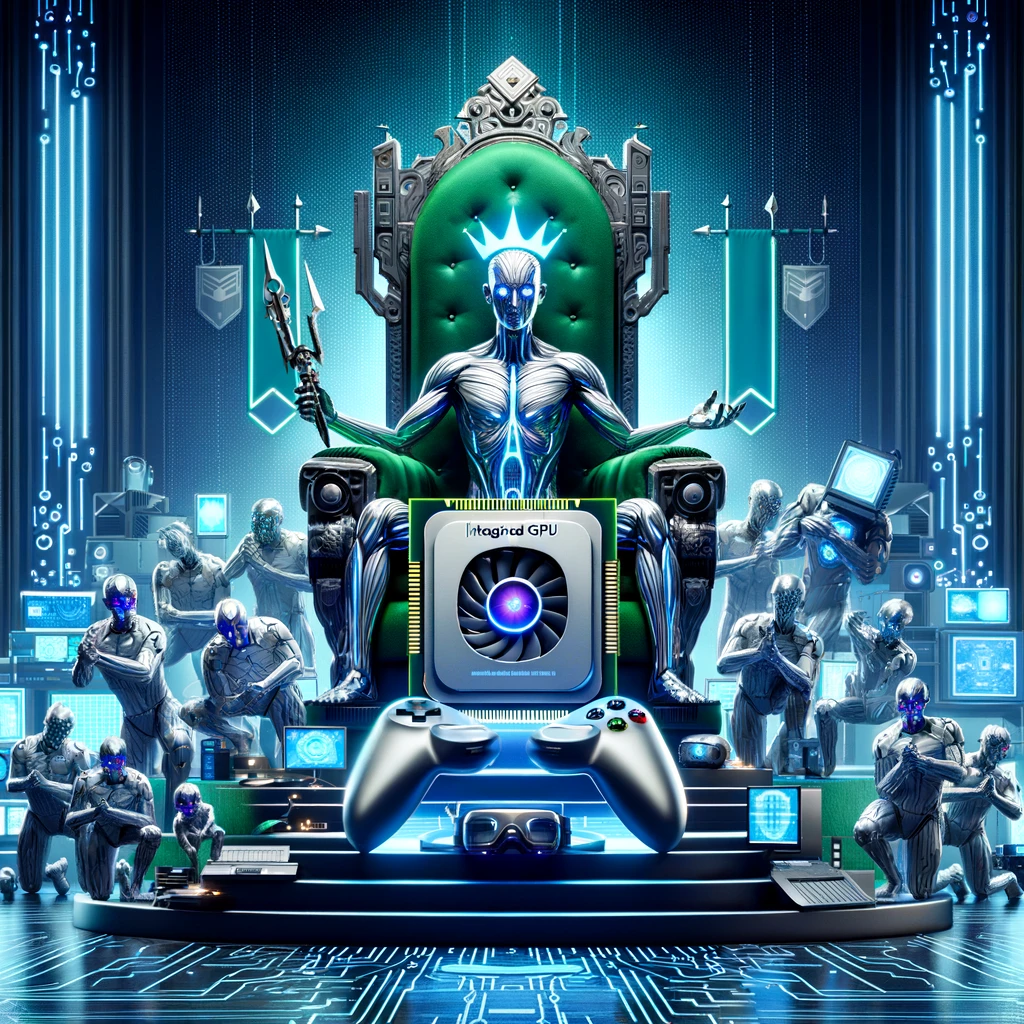From underdog to king: integrated GPU
iGPUs becoming too good too fast, bound to take over gaming

To dominate the gaming market, you don't need raw power. You need brains. In the ever-evolving landscape of gaming technology, integrated Graphics Processing Units (iGPUs) have made significant strides and challenge the dominance of discrete GPUs (dGPUs). The gap is narrowing, thanks to advancements in performance, efficiency, and the integration of AI and ML technologies. So, are iGPUs poised to dominate the gaming market?
Modern iGPUs, such as AMD's Radeon 780M and Intel's Arc iGPUs, show impressive performance, as they can deliver over 60 FPS at 1080p in demanding games like Cyberpunk 2077 and other popular titles[1][2][3]. The demonstrated ability to handle modern games at playable frame rates, make iGPUs a viable option for a big chunk of people: the casual gamers[4][8][9]. Significant improvements in iGPU performance make it possible to enjoy PC gaming without a discrete GPU, increasing their appeal for mainstream gaming[21].
While discrete GPUs (dGPUs) still dominate the high-performance gaming segment, with NVIDIA holding a significant 87% market share of dGPUs in Q2 2023[7][12], the iGPU market is projected to grow. dGPU manufacturers are like students cramming the night before an exam, procrastinating the inevitable shift instead of embracing it. It's almost endearing, if it weren't so shortsighted. Driven by the demand for compact and power-efficient computing solutions, the market size for iGPUs was valued at USD 21.63 billion in 2023 and is expected to reach USD 31.02 billion by 2030, growing at a CAGR of 5.31%[6]. But this can be a big underestimation.
The development of faster memory standards like DDR6 and GDDR7 alone promises higher bandwidths and speeds[1]. High-speed and high-capacity memory is crucial for optimal iGPU performance, and while the increase in overall cost of a system[8] and iGPUs sharing of system memory with the CPU can be limiting factors, this also means not having to provide dedicated VRAM as for dGPUs, even if this means a slight loss in performance for more memory-intensive applications and games.
Let's be clear. iGPUs are not (yet) a complete replacement for dGPUs in high-end gaming scenarios, particularly in handling ultra-high resolutions like 4K gaming[23]. iGPUs tend to generate more heat when handling demanding tasks, which can affect the overall thermal management of a system. In contrast, dGPUs, while also generating heat, are often better equipped with cooling solutions[10]. But the added components for dGPUs increase complexity and volume and, often, cost. This is a part of the reason why iGPUs are still generally positioned as a cost-effective solution for casual gaming and general-purpose computing. And also the reason why, while they are becoming more capable, the erosion of dGPUs' market share for high-end gaming and professional applications[4][11][13] will need more time.
Do not discard our human limitations and needs. Research indicates that player performance and satisfaction are significantly linked to psychological well-being and enjoyment. Players' satisfaction with in-game performance, such as frame rates and graphics quality, contributes to their overall gaming experience and psychological health[18][19]. Moreover, the connection between in-game performance and psychological well-being underscores the importance of balanced performance, which iGPUs are increasingly capable of providing[20]. This means that many gamers - at least the human ones! - are perfectly satisfied with moderate graphical performance.
Console gamers, blissfully unaware, have been using iGPUs all along. Surprise! Your beloved Nintendo Switch, Steam Deck, PS5, Xbox, and many more, all use iGPUs[5][26][24]! Moreover, many users do not notice significant differences between 90Hz and 120Hz displays for everyday use, indicating that extreme performance is not always necessary for a satisfying gaming experience[6].
This explains why the integration of ML or AI capabilities into CPUs and GPUs is also becoming a priority for chipmakers like AMD, Intel, Qualcomm, etc., as it can further boost future performance dynamics[5]. The introduction of a Neural Processing Unit (NPU) can boost the perceived iGPU performance, aligning with the trend of using these technologies to optimize gaming experiences[22]. Technologies such as AMD's FidelityFX Super Resolution (FSR), NVIDIA's Deep Learning Super Sampling (DLSS), or Intel Xe Super Sampling (XeSS), can enhance gaming performance by upscaling lower-resolution images to higher resolutions, thereby reducing the need for extremely powerful hardware[7][8][9]. These technologies can offload some calculations to the NPU instead of the CPU or GPU, further optimizing performance and efficiency[15][28].
Hardcore picky gamers, not a video for you. Source: @ZachsTechTurf
Looking into the near future, the transition from x86 to ARM[30][31], and later on probably to RISC-V architectures, is gaining momentum[28][29], driven by the need for power efficiency and performance improvements. ARM-based processors, like Apple's M chips and Qualcomm's Snapdragon chips, have demonstrated significant performance gains while maintaining low power consumption, making them suitable for handling common computation tasks and even gaming on portable devices[12][14]. RISC-V, an open-source instruction set architecture, is still in its early stages but promises flexibility and customization, which could lead to optimized gaming performance in the future[13]. In this current shift, Intel and AMD need to innovate again if they don't want their over-reliance on x86 architecture to suffocate their businesses.
Game developers constantly need to adapt their software to run efficiently, and especially if changing architectures. Even if such a transition is sweetened by translation layers, it may still require additional resources and time to optimize games for ARM platforms now, and possibly RISC-V later. However, the growing support for these architectures in development tools and engines, such as Unity and Unreal Engine, is making this process more manageable[14][15]. The shift to ARM and RISC-V could also lead to more cross-platform compatibility, allowing games to run seamlessly on various devices' categories, from smartphones to high-end PCs[12][14].
Game streaming services such as NVIDIA GeForce Now, Microsoft's Xbox Cloud Gaming, or Amazon Luna, just to name a few[25], are also changing the landscape of gaming by allowing users to play high-end games on devices with modest hardware. These services offload the heavy lifting to powerful cloud servers, making the need for high-performance local hardware less critical. This offer is bound to further diminish the reliance on discrete GPUs for many gamers, as the performance is handled remotely and streamed to the user's device[16][17].
The question is not if iGPUs will dominate the gaming market, but when. Current generations already meet most users' needs, with minor performance improvements going unnoticed. Gaming on consoles, smartphones, and mainstream laptops, whether locally or via streaming, has made dGPUs unnecessary for many gamers. With more efficient architectures and software enhancements, the gap between iGPUs and dGPUs will narrow, relegating dGPUs to specific use cases. Enthusiast gamers seeking the latest and fastest hardware will persist, much like the niche market for physical keyboards on portable phones, now driven by nostalgic fans[27]. The transition will likely occur as consumers replace old hardware with new, without fanfare for the new ruler, marking the natural end of x86 systems that failed to adapt.
[1] Reddit - improved intel igpus?
[2] Notebookcheck - Intel shows XeSS performance boost for Meteor Lake iGPU running Dying Light 2
[3] Techpowerup - Moore Threads MTT S80 dGPU Struggles to Keep Up with Modern Radeon iGPUs
[4] Readly - State of the pc integrated graphics
[5] CLXgaming - Understanding IGPU: The Future of Integrated Graphics
[6] Techpowerup - AMD Reports First Quarter 2024 Financial Results
[7] Tom's Hardware - AMD takes CPU market share from Intel in desktops and servers, but Intel fights back in laptops
[8] Hardware Times - AMD’s Ryzen Desktop CPU Market Share Grows by 21% in Q1 2024; Mobile/Server Flat
[9] Quantum Precision Research PS - 2024 Graphics Processing Unit (GPU) Market Trends Research Report to 2032
[10] Market Research Masters - Integrated Graphics Processors Market Research Report 2024
[11] Micron - Blurring lines: Why Micron memory matters in fueling AI acceleration
[12] CIO - Innovative data integration in 2024: Pioneering the future of data integration
[13] Microsoft - New infrastructure for the era of AI: Emerging technology and trends in 2024
[14] Electronics Foru - Tech That Will Thrive In 2024: AI And Beyond
[15] Telefonica - 7 relevant technology trends in 2024
[16] Frontiers in Psychology - Gaming well: links between videogames and flourishing mental health
[17] Computers in Human Behavior - Satisfaction and frustration of basic psychological needs in the real world and in video games predict internet gaming disorder scores and well-being
[18] Computers in Human Behavior - Impacts of real-world need satisfaction on online gamer loyalty: Perspective of self-affirmation theory
[19] Lecture Notes in Computer Science - Player Performance, Satisfaction, and Video Game Enjoyment
[20] New Media & Society - Connecting in-game performance, need satisfaction, and psychological well-being: A comparison of older and younger players in World of Tanks
[21] Youtube - PC Gaming Without a GPU is Finally Good
[22] Youtube - Ryzen 7 8700G First Look, The Most Powerful iGPU Ever! No Graphics Card Needed
[23] Youtube - 4K Gaming On Ryzen 7000 iGPU... For some reason
[24] Videogamer - What is the PS5 equivalent gaming PC?
[25] PCMag - The Best Game Streaming Services for 2024
[26] Technopedia - ROG Ally vs. Steam Deck: Battle of the Gaming Handhelds
[27] Liliputing - Clicks keyboard case gives the iPhone Pro the physical keys it wasn’t really missing
[28] The Verge - Microsoft’s ‘Auto Super Resolution’ DLSS competitor isn’t exclusive to Qualcomm
[29] Tom's Hardware - World's first RISC-V handheld gaming system announced — retro gaming platform uses Linux
[30] SiliconANGLE - Arm debuts new flagship mobile CPU and GPU designs
[31] Tom's Hardware - Copilot+ PCs: All we know about the AI-ready laptops and exclusive Windows features




